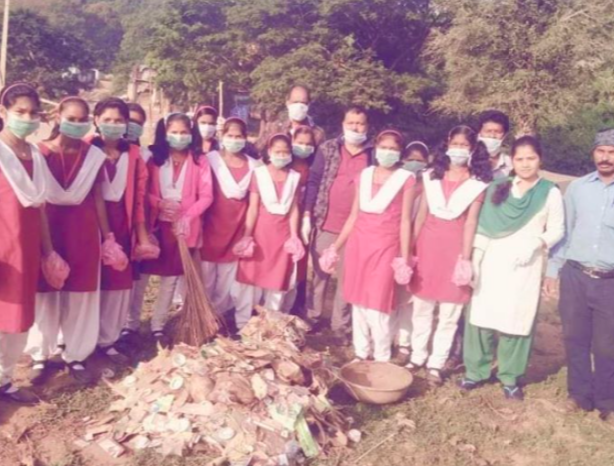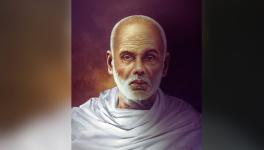Niyamgiri: Dongria Kondh Girls Made to Clean Hindu Temples

In Odisha’s Niyamgiri hills, particularly vulnerable tribal groups (PVTGs) are reportedly being made to clean Hindu temples—even as the community has been waging a struggle for their land claims and to safeguard their most revered mountain god, Niyamraja for several years.
Speaking to NewsClick, a local activist, on the condition of anonymity, said, “Dongria Kondh Development Agency is a part of the Integrated Tribal Development Agency (ITDA) whose task is to protect the culture of the tribe. Instead, Brahmanical ideals are being imposed on the community, which does not subscribe to Hinduism.”
The activist told NewsClick that Dongria Kondh girls from a school are being made to clean a Shiva temple in Niyamgiri.
The issue of the cleaning of temples is the one that is deeply rooted in the subversion of the Adivasi culture, oriented towards incorporating them in the “mainstream or the Hindu fold”.
Adivasis have been traditionally perceived to have been outside the caste structure. Adivasi societies, in turn, consider themselves distinct from the majority Hindu population of India, as well as from most other organised forms of religion. In post-independence India, the State has further marginalised adivasi communities through a systematic process of taking away their lands and resources under the garb of “progress” and “development.”
Also read: Tribals Subjected to Cultural and Religious Imposition in MP and Chhattisgarh
Speaking to NewsClick, Prafulla Samanta of the National Alliance of People’s Movements (NAPM), said, “The imposition of Hinduism on Adivasis reflects the bigger project of the Rashtriya Swayamsevak Sangh (RSS).”
The saffron organisation’s efforts to recast adivasis as vanvasis is a critical component of their ideological project. Their project of Hindu Rashtra rests on the claim of Hindus being indigenous to India. Any other claimants to that slot, as Adivasis are, fundamentally challenge their project of a Hindu Nation. Vinayak Damodar Savarkar, in his book, Essentials of Hindutva, had claimed that the “aboriginal or hill tribes also are Hindu: because India is their Fatherland as well as their Holy Land”. Even Gandhi agreed with this worldview and claimed that the tribals had been part of Hinduism from time immemorial.
The question of religion and particularly of their inclusion into the Hindu fold has given rise to protests from many tribal communities. In April, tribal representatives from 19 states protested at Jantar Mantar in Delhi to demand the inclusion of their religion(s) in Census 2021. A 22-year-old tribal youth from Chhattisgarh’s Surajpur district had reportedly killed himself on October 9, 2019 to oppose the Durga Puja conducted at his home. The deceased, Jitendra Maravi or Sonu, was a resident of Ketaka village of Surajpur district in the Adivasi-majority state of Chhattisgarh. He took his own life after Durga Puja was performed at his house despite his objections.
In 2017, tribals of Madhya Pradesh’s Betual had threatened to take action against those who are burning the effigies of Ravana. The tribal populations, in addition to leading movements for the protection of their land rights and safeguarding the forests, are also leading another major battle against the cultural and religious imposition on them. They are asserting that they are not Hindu by birth according to the Indian Constitution and any change in their religion does not legally alter their constitutional status.
Get the latest reports & analysis with people's perspective on Protests, movements & deep analytical videos, discussions of the current affairs in your Telegram app. Subscribe to NewsClick's Telegram channel & get Real-Time updates on stories, as they get published on our website.
























